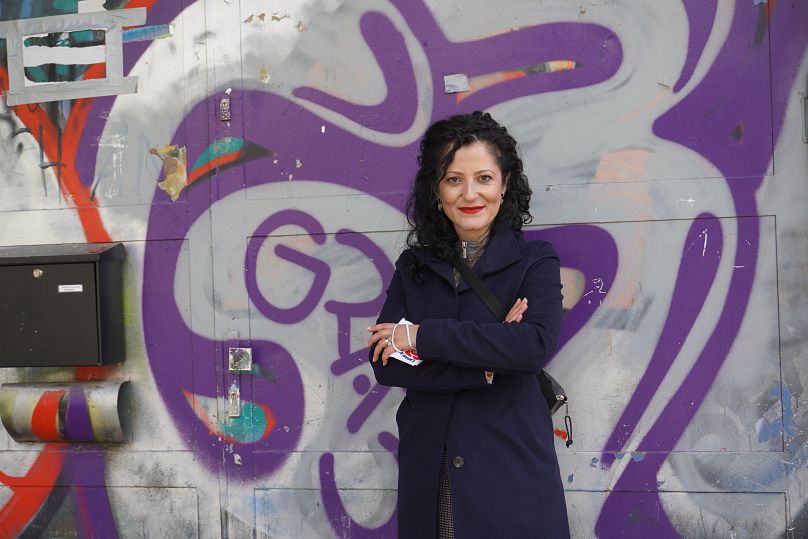Germany has the second-worst political representation for minorities in Europe, with just 14 out of over 700 federal lawmakers of Turkish background.
When Cansel Kiziltepe was growing up in Berlin in the 1980s, her parents would vow every summer that this would be the year that the family would return to Turkey.
 ADVERTISEMENT
ADVERTISEMENT
 ADVERTISEMENT
ADVERTISEMENT
“Every year it would be 'next year, next year' until I realised that I was already at high school and that it would never happen. We lived here. We belonged here,” Kiziltepe told Euronews.
The daughter of Turkish guest workers that came to Berlin in the 1960s, Kiziltepe is now one of only a handful of German politicians with a minority background in the Bundestag. On Sunday, she will defend her Berlin seat as a candidate for the Social Democratic Party (SDP).
A recent study published by academics Şener Aktürk and Yury Katliarou found that after France, Germany has the worst record of representation of minorities as members of parliament in Europe, with just 14 politicians of Turkish background in the 709-seat Bundestag.
That deficit is echoed in the number of Turkish residents of Germany that have the right to vote, estimated at just 30% by Berlin-based consultancy Data4U.
Despite popular opinion -- especially on the right -- those disenfranchised voters are not new arrivals or seasonal workers, many have lived and paid taxes in Germany for decades. Kiziltepe’s own parents, who moved to Berlin in the 1960s, still do not have the right to vote.
“It makes me angry that so many people are not allowed to vote. My parents lived in Germany for 60 years and are still not allowed to vote, neither at the local level nor at the state level - let alone at the federal level,” Kiziltepe said.
She favours voting rights being given to all permanent residents of Germany, providing Turkish immigrants with the same rights as European Union citizens, who are permitted to vote.
It is little surprise that Kiziltepe’s SPD wins an overwhelming share of the Turkish-German vote at national and local elections, with Data4U finding in a poll prior to the 2017 elections that 60% support the left-leaning party, 23% vote Green and just 10% vote for the Christian Democratic Union (CDU), the party Chancellor Angela Merkel has led for 16 years.
The CDU has always struggled to attract voters from Germany’s Turkish community, and not just because the Christian party has no appeal to a predominantly Muslim demographic.
As recently as 2016, the CDU voted in favour of revoking Germany’s dual citizenship regulations. It was Merkel who had to step in and shut the discussion down.
In many ways, the joint citizenship debate is a classic rallying cry for the right and far-right, given that it is a red herring that plays well in the right-wing press but has little basis in fact.
Only a tiny proportion, 7%, of Germans of Turkish descent actually have German and Turkish passports. Indeed, only 39% of Turks in Germany have a German passport, Data4U revealed in 2017.
That not only means that millions of Turks in Germany do not have the right to vote, but are barred from certain professions - including teaching, the police force and the armed forces.
Even as a well-known politician from Berlin who has sat in the Bundestag since 2013, Kiziltepe has had to get used to discrimination when out campaigning.
“You have to have thick skin,” she told Euronews.
“When the door slams in your face and you realise why. These are not nice things. You get a lump in your throat. Your eyes get wet. But you have to rise above it.”
It hasn’t only been the conservative and far-right that has contributed to the otherness experienced by Turkish-Germans in recent years, but the Turkish government in Ankara.
Ahead of polling day in 2017, Turkish President Recep Tayyip Erdogan told Turkish-German voters to boycott not only the CDU but the SDP and the Greens in a row over whether Turkish politicians were permitted to canvass for votes in Germany.
At the time, Kiziltepe said that Erdogan had "poisoned" the climate and "torn down" what politicians like herself and the SPD had built up over decades. In the years since, the SPD -- which has 40 candidates of minority background running this year -- has tried to rebuild it.
Part of that effort has been reaching out to the majority of Turks and Germans with Turkish backgrounds that speak mostly -- or entirely -- Turkish and the 84%, according to Data4U, that consume only Turkish language media, much of it pro-Erdogan and his AKP party.
During the COVID-19 pandemic, the German authorities struggled to communicate with the Turkish minority in neighbourhoods like Neukoelln, the German capital’s crowded immigrant neighbourhood.
The situation got so bad that a multilingual team, of five street workers went out in the community to explain the dangers of COVID-19 to those who are often not reached through government efforts.
Kiziltepe recently released a bilingual video on social media explaining exactly how this year’s election works. In her constituency voters will be voting in three separate races, including state and house elections and the Bundestag, as well as a referendum on whether the state should expropriate rental properties - a complicated process even for a German speaker.
“You have to have talks, have dialogue and show how important political participation is - and have an integrative approach,” she said. “Because these people also belong to us. They have lived here for decades. They belong here.”
_This is article is part of our special mini-series to help you understand the German election.
_











